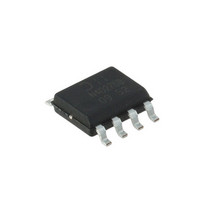ZXLD1366EN8TC Diodes Zetex, ZXLD1366EN8TC Datasheet - Page 26

ZXLD1366EN8TC
Manufacturer Part Number
ZXLD1366EN8TC
Description
SEMICONDUCTOR OTHER
Manufacturer
Diodes Zetex
Datasheet
1.ZXLD1366ET5TA.pdf
(30 pages)
Specifications of ZXLD1366EN8TC
Constant Current
*
Constant Voltage
*
Topology
*
Number Of Outputs
*
Internal Driver
*
Type - Primary
*
Type - Secondary
*
Frequency
*
Voltage - Supply
*
Voltage - Output
*
Mounting Type
Surface Mount
Package / Case
8-SOIC (0.154", 3.90mm Width) Exposed Pad
Operating Temperature
*
Current - Output / Channel
*
Lead Free Status / RoHS Status
Lead free / RoHS Compliant
Other names
ZXLD1366EN8TCTR
Available stocks
Company
Part Number
Manufacturer
Quantity
Price
Company:
Part Number:
ZXLD1366EN8TC
Manufacturer:
Diptronics
Quantity:
60 000
Part Number:
ZXLD1366EN8TC
Manufacturer:
ZETEX
Quantity:
20 000
A Product Line of
Diodes Incorporated
ZXLD1366
Application Information
(Continued)
Figure 8. Suggested layout for SO-8EP package
Vias ensure an effective path to the ground plane for the heat flow therefore reducing the thermal impedance between
junction and ambient temperature. Diodes came to the conclusion that the compromise is reached by using more than 10 vias
with 1mm of diameter and 0.5 hole size.
Finally the same scheme in figure 7 (without the exposed paddle) can be usde for the TSOT23-5 package guaranteeing an
effective thermal path.
Thermal compensation of output current
High luminance LEDs often need to be supplied with a temperature compensated current in order to maintain stable and
reliable operation at all drive levels. The LEDs are usually mounted remotely from the device so, for this reason, the
temperature coefficients of the internal circuits for the ZXLD1366 have been optimized to minimize the change in output
current when no compensation is employed. If output current compensation is required, it is possible to use an external
temperature sensing network normally using Negative Temperature Coefficient (NTC) thermistors and/or diodes, mounted
very close to the LED(s). The output of the sensing network can be used to drive the ADJ pin in order to reduce output
current with increasing temperature.
Layout considerations
LX pin
The LX pin of the device is a fast switching node, so PCB tracks should be kept as short as possible. To minimize ground
'bounce', the ground pin of the device should be soldered directly to the ground plane.
Coil and decoupling capacitors and current sense resistor
It is particularly important to mount the coil and the input decoupling capacitor as close to the device pins as possible to
minimize parasitic resistance and inductance, which will degrade efficiency. It is also important to minimize any track
resistance in series with current sense resistor R
. Its best to connect V
directly to one end of R
and I
directly to the
S
IN
S
SENSE
opposite end of R
with no other currents flowing in these tracks. It is important that the cathode current of the Schottky
S
diode does not flow in a track between R
and V
as this may give an apparent higher measure of current than is actual
S
IN
because of track resistance.
ADJ pin
The ADJ pin is a high impedance input for voltages up to 1.35V so, when left floating, PCB tracks to this pin should be as
short as possible to reduce noise pickup. A 100nF capacitor from the ADJ pin to ground will reduce frequency modulation of
the output under these conditions. An additional series 3.3kΩ resistor can also be used when driving the ADJ pin from an
external circuit (see next page). This resistor will provide filtering for low frequency noise and provide protection against high
voltage transients.
26 of 30
ZXLD1366
March 2011
www.diodes.com
© Diodes Incorporated
Document number: DS31992 Rev. 6 - 2



















